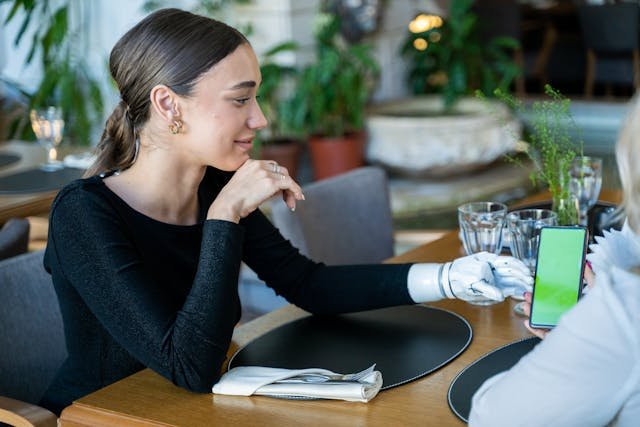For individuals with partial hand or wrist disarticulation amputations, choosing the right prosthetic can make a significant difference in mobility, function, and confidence. Unlike full hand or arm amputations, partial hand and wrist disarticulation cases present unique challenges because the residual limb retains some natural movement and sensory feedback. The right prosthetic must enhance what remains, rather than replace the entire function of the missing hand.
Today, advancements in prosthetic technology offer lightweight, customizable, and highly functional solutions for those with partial hand loss or wrist disarticulation. From passive prosthetic hands for cosmetic restoration to bionic hands with myoelectric control, there are options suited for different needs, lifestyles, and activity levels.
This article explores the best prosthetic solutions available, comparing their strengths, functionality, and suitability for daily life, work, and recreation.
Understanding the Needs of Partial Hand and Wrist Disarticulation Amputees
Every amputee has different functional needs depending on the level of limb loss, lifestyle, and personal goals. Partial hand amputations and wrist disarticulations require prosthetics that restore grip, improve dexterity, and allow for natural movement while ensuring comfort and durability.
Challenges of Partial Hand and Wrist Disarticulation Amputations
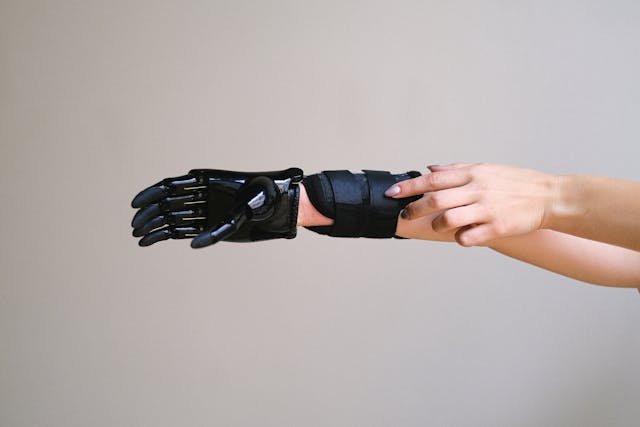
Unlike below-elbow or above-elbow amputations, where prosthetics replace a full missing limb, partial hand and wrist-level amputations retain part of the forearm or some hand function. This makes fitting a prosthetic more complex because it needs to integrate with the remaining limb structure.
One of the biggest challenges is socket design. The socket must be comfortable and secure while allowing for wrist rotation and movement where applicable. If not properly fitted, it can cause skin irritation, pressure points, or limited functionality.
Another issue is grip restoration. People with partial hand loss often require a prosthetic that supports fine motor control, grasping strength, and object manipulation. Prosthetics need to balance durability with lightweight materials to ensure ease of use.
The Importance of Customization and Comfort
Customization plays a crucial role in prosthetic comfort and efficiency. Since every residual limb is different, prosthetic hands and fingers must be designed to match the user’s natural hand shape and movement patterns.
A well-fitted prosthetic should allow for secure attachment without causing discomfort. Soft liners, flexible materials, and adjustable sockets ensure that the user can wear the prosthetic for extended periods without pain or strain.
Additionally, cosmetic customization allows users to choose between lifelike prosthetic hands or functional, high-tech designs depending on their personal preferences and needs. Some users prefer a natural-looking prosthetic, while others opt for a bionic aesthetic with high-tech capabilities.
Balancing Functionality and Aesthetic Appeal
Some users prioritize functionality, requiring a prosthetic that restores grip strength and dexterity for work or daily tasks. Others may seek a passive or cosmetic prosthetic that restores the appearance of a full hand without needing advanced mechanical function.
The best prosthetic option depends on how often the hand is used, the types of activities performed, and the level of remaining limb functionality. Whether for manual labor, office work, sports, or personal comfort, the right prosthetic will enhance independence and confidence.
Types of Prosthetic Hands for Partial Hand and Wrist Disarticulation Amputees
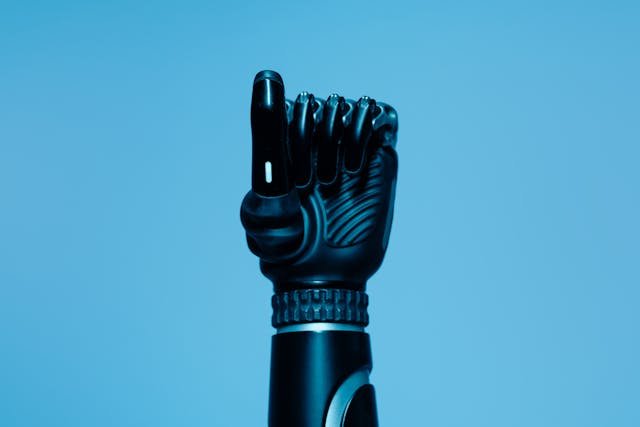
Several prosthetic options exist for partial hand loss and wrist disarticulation, each designed for different functional and aesthetic needs. Choosing the right one depends on daily activities, personal goals, and comfort preferences.
Passive Prosthetic Hands for Cosmetic Restoration
For individuals who prioritize appearance over function, passive prosthetic hands offer aesthetic restoration without requiring mechanical movement. These prosthetics are designed to match the skin tone, shape, and size of the natural hand, creating a lifelike appearance.
Passive prosthetics provide psychological benefits, helping users feel more comfortable in social settings. While they do not have active grip control, they can assist in stabilizing objects or supporting the natural hand during two-handed activities like typing or holding a book.
Another advantage of passive prosthetic hands is their lightweight construction. Since they do not contain complex mechanical parts, they are comfortable for long-term wear. They are also low maintenance, requiring minimal upkeep compared to functional prosthetics.
Body-Powered Prosthetic Hands for Simple Mechanical Control
For users who need basic gripping function, body-powered prosthetics provide a strong and reliable mechanical grip. These prosthetics use a harness and cable system to control hand movement by translating upper-body motions into grip force.
One of the biggest benefits of body-powered prosthetics is their durability and reliability. Since they do not rely on batteries or electronics, they function in all environments, including water and extreme temperatures. Users who work in outdoor or physically demanding jobs often prefer body-powered prosthetics for their strength and simplicity.
While they offer less natural movement compared to myoelectric hands, body-powered prosthetics still allow users to perform essential tasks like lifting objects, holding tools, and gripping everyday items. They are also more affordable than high-tech prosthetic solutions.
Myoelectric Prosthetic Hands for Advanced Control
For those seeking high-tech functionality, myoelectric prosthetic hands provide intuitive, muscle-controlled movement. These advanced prosthetics use electrical signals from the remaining forearm muscles to control the hand’s grip and motion.
Myoelectric prosthetic hands offer multiple grip patterns, allowing users to switch between different grip strengths, wrist rotations, and fine motor controls. This makes them ideal for office work, cooking, and detailed tasks like writing or using a smartphone.
Another advantage of myoelectric hands is their natural movement and responsiveness. Unlike body-powered prosthetics, which require shoulder movement to control grip, myoelectric hands respond to small muscle contractions, making movements feel more fluid and effortless.
One consideration with myoelectric prosthetics is battery life and maintenance. Since they rely on electrical power, they require regular charging and occasional software updates to maintain optimal function. Despite this, they provide the most lifelike hand function available today.
Partial Hand Prosthetics for Finger-Level Amputations
For individuals who have lost one or more fingers but retain some hand function, partial hand prosthetics restore individual finger movement and grip strength. These prosthetics range from simple mechanical designs to high-tech bionic fingers with electronic control.
Finger-level prosthetics allow users to grasp objects, type, and perform daily tasks with greater ease. Some models are designed with flexible, adaptive grips, enabling them to adjust automatically to different object shapes and sizes.
The best partial hand prosthetic depends on the number of fingers lost and the remaining hand functionality. Custom-fitted designs ensure seamless integration with the natural hand for better grip, stability, and movement coordination.
The Role of Rehabilitation and Training in Maximizing Prosthetic Use
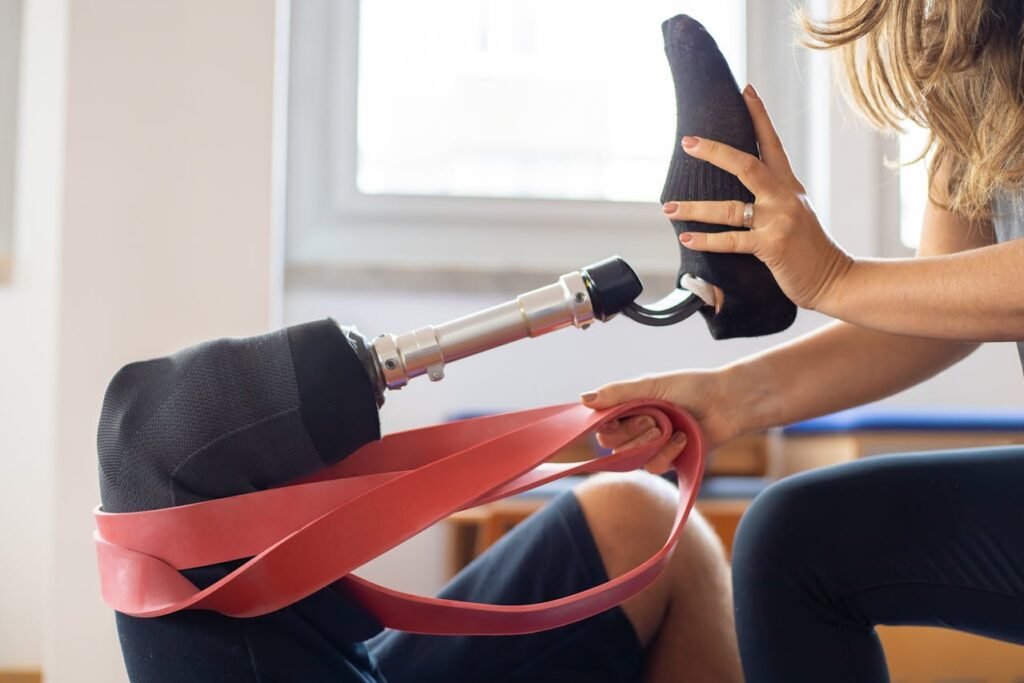
Getting the right prosthetic is just the beginning. For partial hand and wrist disarticulation amputees, successful adaptation requires training, rehabilitation, and consistent practice. The goal is to make the prosthetic feel like a natural extension of the body, improving grip strength, movement coordination, and daily function.
Strengthening the Residual Limb for Better Control
Before fully adapting to a prosthetic, the residual limb and surrounding muscles must be strong enough to support grip function and movement stability. Physical therapy plays a crucial role in preventing muscle atrophy and improving endurance.
For myoelectric prosthetic users, training focuses on muscle contraction exercises to help develop strong, consistent signals for the prosthetic sensors. Practicing wrist flexion, extension, and forearm rotation improves muscle control, ensuring smoother and more natural prosthetic responses.
For body-powered prosthetic users, strengthening shoulder, chest, and upper-arm muscles is important for efficient cable activation. Resistance band exercises and light weight training help users improve force generation and reduce fatigue, allowing them to use their prosthetic for longer periods without discomfort.
Developing Grip Coordination for Daily Tasks
Grip training is essential for learning how to handle objects with the right amount of pressure. New users often struggle with gripping too hard and crushing objects or applying too little force and dropping items. Practicing with different materials and object sizes helps improve grip sensitivity and coordination.
A good training strategy is to start with simple tasks like holding a cup, picking up coins, or grasping a pen before moving on to more complex activities such as tying shoelaces, using utensils, or typing on a keyboard. This gradual approach helps build confidence and dexterity.
For myoelectric prosthetic users, training with biofeedback technology helps refine muscle signal control, improving grip response time. Body-powered users benefit from adjusting cable tension to fine-tune grip activation for smoother movements.
Integrating the Prosthetic into Everyday Life
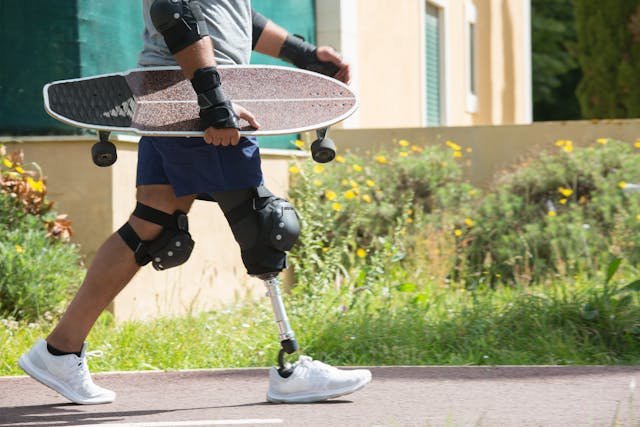
Once basic skills are developed, the next step is adapting the prosthetic to real-world activities. Simple adjustments can make daily life easier, such as modifying grip strength for different tasks, experimenting with wrist positioning, and learning how to switch grip modes efficiently.
For work-related tasks, users should practice using tools, keyboards, or office supplies to ensure smooth transitions between different hand functions. Athletes and musicians can work with customized prosthetic designs that match the specific movements required for their profession or hobby.
Social adaptation is equally important. Practicing handshakes, gestures, and interactions helps users feel more confident when engaging with others. Connecting with support groups and rehabilitation specialists can provide additional guidance, motivation, and real-world tips for better prosthetic use.
Advancements in Prosthetic Technology: The Future of Partial Hand and Wrist Disarticulation Prosthetics
Prosthetic technology is evolving rapidly, offering new levels of control, comfort, and adaptability for partial hand and wrist disarticulation amputees. Innovations in bionic engineering, artificial intelligence, and material science are making prosthetic hands more lifelike, functional, and intuitive than ever before.
Bionic and Smart Prosthetics for Enhanced Control
The rise of bionic prosthetic hands has transformed the way amputees interact with their environment. These advanced devices use artificial intelligence (AI) and neural sensors to provide highly responsive and customizable grip patterns.
Some cutting-edge prosthetics now feature AI-driven adaptive learning, allowing the prosthetic to recognize a user’s muscle signals and daily habits. Over time, the system can automatically adjust grip force and movement speed based on the task at hand. This creates a more natural, intuitive experience, reducing the need for manual adjustments.
In addition, researchers are developing brain-controlled prosthetics that bypass traditional muscle-based systems. These devices connect directly to the nervous system, allowing for near-instant hand movements and a level of precision previously thought impossible. While still in early stages, these innovations promise a future where prosthetics behave almost like natural hands.
Haptic Feedback: Bringing the Sense of Touch to Prosthetics
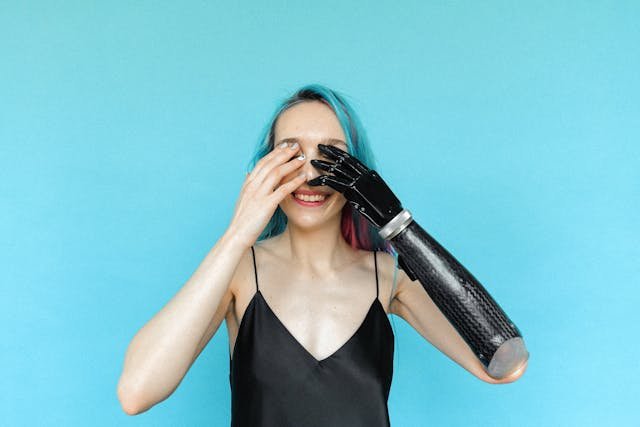
One of the biggest limitations of traditional prosthetics is the lack of sensory feedback. Users must rely on visual cues to judge grip strength, often leading to accidental crushing or dropping of objects.
Haptic feedback technology aims to solve this issue by reintroducing the sense of touch into prosthetic hands. Tiny pressure-sensitive sensors in the fingertips can detect texture, weight, and resistance, sending signals back to the user’s nervous system or residual limb. This allows for real-time grip adjustments based on sensory input, making prosthetic interactions more natural and accurate.
Some new prosthetic designs also incorporate vibration-based feedback, where the prosthetic vibrates at different intensities to indicate grip pressure or surface texture. This technology enables users to better judge the amount of force needed for delicate tasks, improving control and overall usability.
Lightweight, High-Strength Materials for Better Durability
Modern prosthetics are now being developed using advanced composite materials such as carbon fiber, graphene-reinforced polymers, and flexible thermoplastics. These materials provide a perfect balance of strength, durability, and lightweight comfort, ensuring that the prosthetic is both robust and easy to wear for long periods.
Researchers are also exploring self-healing prosthetic materials, which can repair minor surface damage on their own, reducing maintenance needs and extending the lifespan of prosthetic hands. Additionally, waterproof and dust-resistant coatings are being integrated into newer models, making them more resilient in extreme environments.
At Robobionics, we are committed to staying at the forefront of prosthetic innovation. Our team is constantly researching and developing new technologies to improve grip strength, user comfort, and prosthetic adaptability. If you’re looking for the latest advancements in partial hand and wrist prosthetics, contact us today to explore cutting-edge solutions designed for your needs.
Choosing the Right Prosthetic Provider: What to Look for in a Prosthetic Clinic
Selecting the right prosthetic provider is just as important as choosing the prosthetic itself. A well-fitted and properly customized prosthetic hand can significantly enhance comfort, functionality, and long-term usability. The right clinic will not only provide a high-quality prosthetic but also offer ongoing support, training, and maintenance to ensure a seamless adaptation process.
Expertise in Partial Hand and Wrist Disarticulation Prosthetics
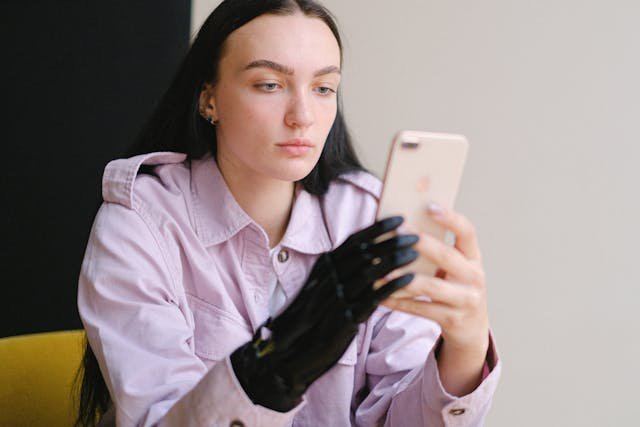
Not all prosthetic providers specialize in partial hand and wrist disarticulation solutions. It’s essential to find a clinic with extensive experience in designing, fitting, and customizing prosthetics for your specific amputation level.
A qualified prosthetist should understand the unique challenges of partial hand loss, including socket design, weight distribution, and functional grip requirements. They should be able to offer personalized solutions, whether you need a passive, body-powered, or myoelectric prosthetic.
Before choosing a clinic, ask about their experience with similar cases, the types of prosthetic hands they offer, and whether they provide custom-fitted solutions tailored to your residual limb’s anatomy.
Access to the Latest Prosthetic Technology
Prosthetic technology is evolving quickly, and the best clinics stay up to date with the latest advancements in bionic hands, haptic feedback, and AI-driven prosthetics. Working with a provider that offers cutting-edge options ensures that you receive a prosthetic with the best possible functionality and durability.
A good prosthetic provider should have a range of options, from simple mechanical hands to advanced myoelectric solutions. They should also offer demo trials so that you can test different prosthetics before making a final decision. This helps ensure that your chosen prosthetic meets your grip strength, comfort, and usability needs.
Comprehensive Rehabilitation and Training Programs
Adjusting to a new prosthetic takes time, and proper training is essential for mastering grip control, movement coordination, and daily functionality. The best prosthetic clinics provide personalized rehabilitation programs that help users train their muscles, develop fine motor skills, and integrate their prosthetic into everyday life.
Look for a clinic that offers one-on-one training sessions, guidance on grip patterns and object handling, and support for myoelectric signal training if you’re using a bionic prosthetic. A well-structured rehabilitation program can significantly reduce the learning curve and improve long-term prosthetic success.
Conclusion: Finding the Right Prosthetic for Your Needs
Choosing a prosthetic for partial hand loss or wrist disarticulation requires careful consideration of comfort, functionality, and lifestyle needs. Whether you need a cosmetic passive hand, a strong body-powered prosthetic, or a high-tech myoelectric solution, there is an option designed to enhance mobility and independence.
At Robobionics, we specialize in custom prosthetic solutions tailored to each user’s needs. If you are looking for the best prosthetic hand for your daily life, work, or personal activities, contact us today for a consultation. Our expert team is here to help you find the perfect balance of comfort, function, and technology, ensuring that your prosthetic fits your unique lifestyle.



